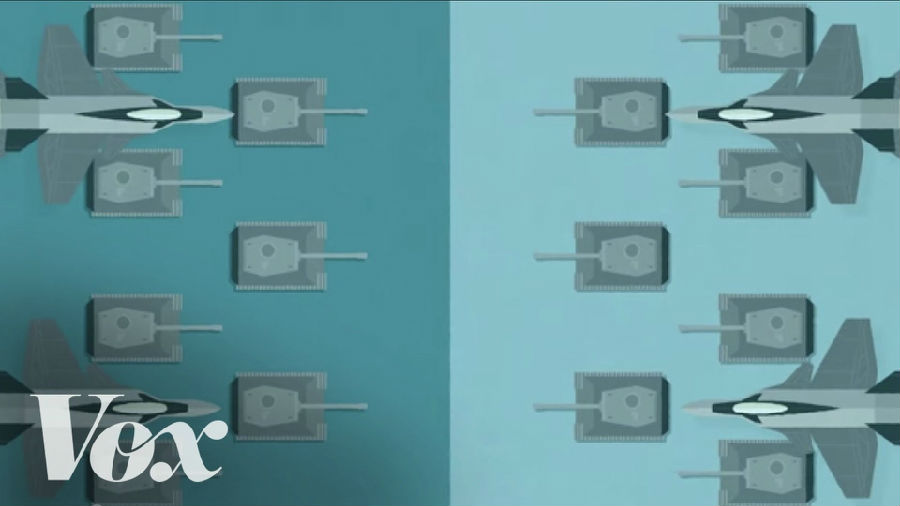So if you read the headlines, it kind of seems like the world is a terrible place, full of violence, despair, and war.
是这样,如果你有看新闻头条的习惯的话,你会觉得这个世界很可怕,到处都是暴力、绝望和战争。
But it turns out war is actually declining.
然而,事实证明,战争已经越来越少了。
We live in the most peaceful time in human history.
我们生活在人类历史上最和平的时代。
There's lots of reasons why, but here are three of the biggest ones.
原因有很多,今天我们来说说三个最重要的原因。
First, the spread of democracy around the world.
首先是民主在世界范围内的传播。
International relations scholars have found consistently that democracies don't fight wars with each other.
国际关系学者一致发现,民主国家之间不怎么打仗。
Now why is that true?
为什么会这样呢?
There might be plenty of reasons,
原因可能有很多,
but one, big one, is that people who live in democracies think it's wrong to start wars with other democracies.
其中一个,还是非常重要的原因是生活在民主国家的人认为不应该对别的民主国家开战。
They're legitimate governments -- it's wrong to attack them.
他们也是合法政府——攻击他们是不对的。
But there's a flipside to this.
不过,民主也有它的另一面:
Democracies do often fight wars with autocracies.
民主国家经常和独裁国家打仗。
Luckily, most of the world's countries are democracies now,
幸运的是,现如今,世界上的大部分国家都走民主路线了。
so the democratic peace is probably making the world a much more peaceful place.
所以,民主和平很可能就是世界变得更加和平的道路上的一大功臣。
Second, big reason why war is declining is nuclear deterrence.
战争越来越少的第二个重要的原因是核威慑。
Nuclear weapons, obviously big and scary.
核武器,很明显是又大又吓人的东西。
However, nuclear deterrence may have prevented a devastating war between the United States and the Soviet Union.
然而,美国和前苏联没有爆发毁灭性的战争,有可能就是核威慑起的作用。
Everyone recognized that they would lose.
所有人都觉得他们会两败俱伤。
Statistical evidence suggests that that is true --
统计证据表明大家的这一看法是正确的——
that most countries are too scared of the consequences of nuclear war to fight one.
大多数国家都是因为太害怕核战争的后果才不敢打核战争。
There's a dark side, and not just the risk of global annihilation from an accident.
核武器不仅有让全世界因为一次偶然毁于一旦的风险,还有它阴暗的一面。
If a country gets nuclear weapons,
如果一个国家拥有了核武器,
they feel rather safer in being aggressive in little ways, you know, small conflicts or bullying around their non-nuclear neighbors.
他们就会更肆无忌惮地在一些小问题上,比如在一些小的冲突中,或是欺负他们没有核武器的邻国的时候表现得咄咄逼人。
This weird paradox, that nuclear weapons make the world more violent and more peaceful at the same time, is called the Stability-Instability Paradox.
这种奇怪的悖论,即核武器既能让这个世界变得更加暴力,也能使其变得更加和平的悖论,又被称为“稳定-不稳定悖论”。
The third reason that war has declined has been the spread of the idea of national sovereignty.
战争越来越少的第三个原因是国家主权思想的传播。

This idea is hundreds of years old, the idea that you shouldn't interfere inside the borders of another state.
这一思想,也即一个国家不应干涉另一个国家边境以内的事务的思想被提出来已经有好几百年了。
But people didn't take the idea too seriously,
问题是,人们并没有太当真,
because stealing new land used to be a major cause of war.
因为在过去,窃取新的土地是人们发动战争的主要原因。
Think American, European colonialism or World War II.
想想美国和欧洲的殖民操作,想想二战。
But after World War II, nations pledged to stop.
不过,二战结束后,各国便一个接一个地承诺停止这种行径了。
Since 1976, there hasn't been a single successful war of conquest, except for maybe Russia in Crimea, really recently.
1976年以后,可能除了前不久俄罗斯对克里米亚发动的吞并战争之外,还没有一次吞并战争是成功了的。
Again though, sovereignty has a flip side.
还是那句话,尽管如此,主权也有它的另一面。
Sometimes governments go to war against their own people,
有时候,一些政府会和他们自己的人民打仗,
and poor, weak governments often collapse into civil war.
很多贫穷、实力不够的政府都是在内战中垮台的。
Sovereignty makes it hard for the international community to intervene to stop either of those kinds of wars.
国家主权的思想就让国际社会很难插手去阻止这些战争。
But on the whole, when you see those terrible headlines,
不过,总的来说,当你看到那些糟糕的新闻头条的时候,
remember the world's way better off than it ever has been.
请记住,现在的世界已经比以前好太多太多了。
There's less war and less violence than almost any other time in human history.
现在的战争和暴力几乎比人类历史上的任何时期都要少。
That's something worth celebrating.
这其实是值得我们庆贺的。












